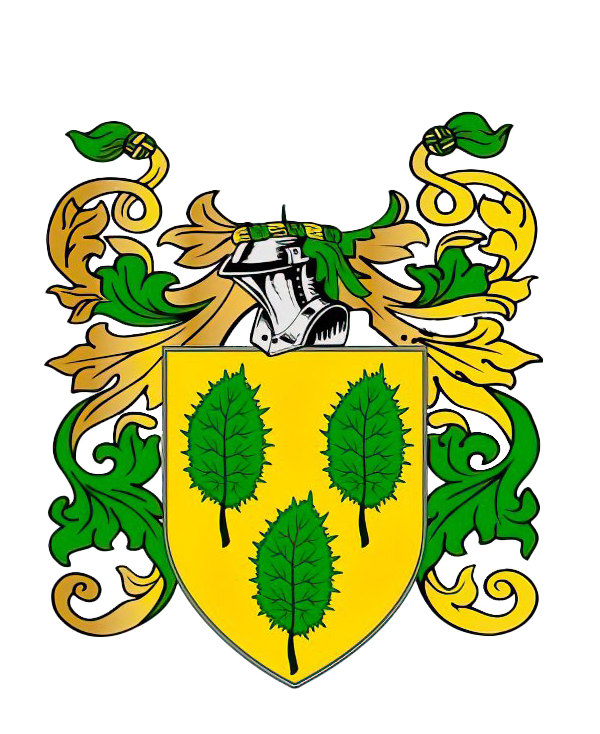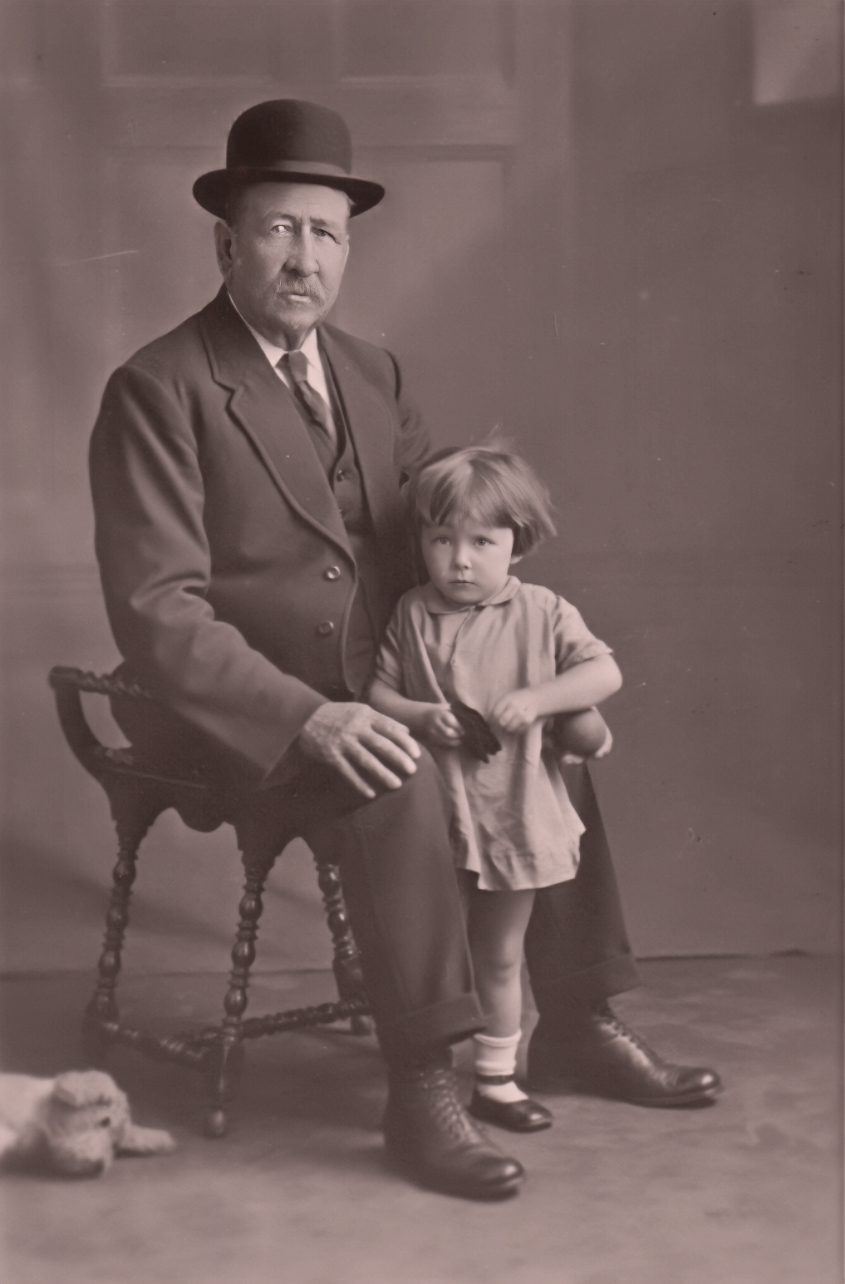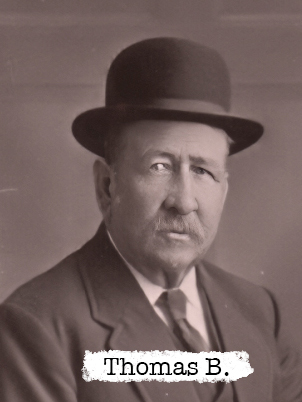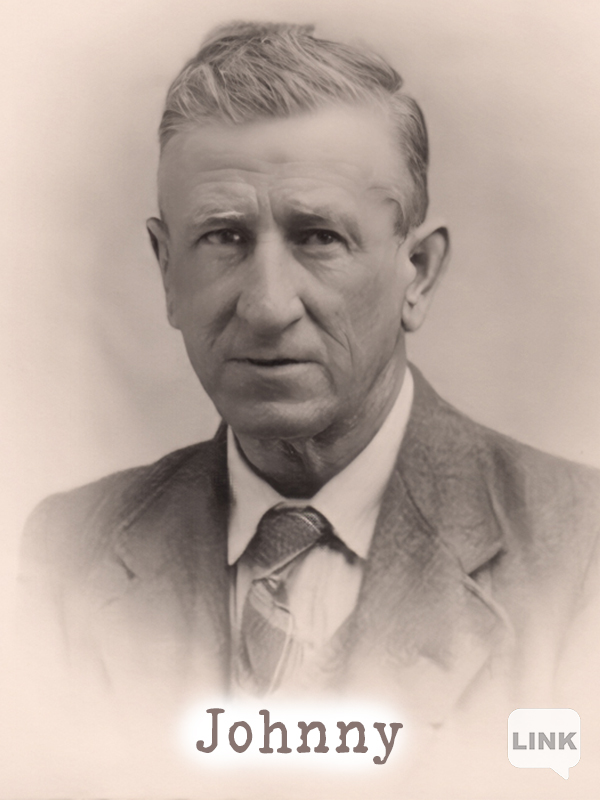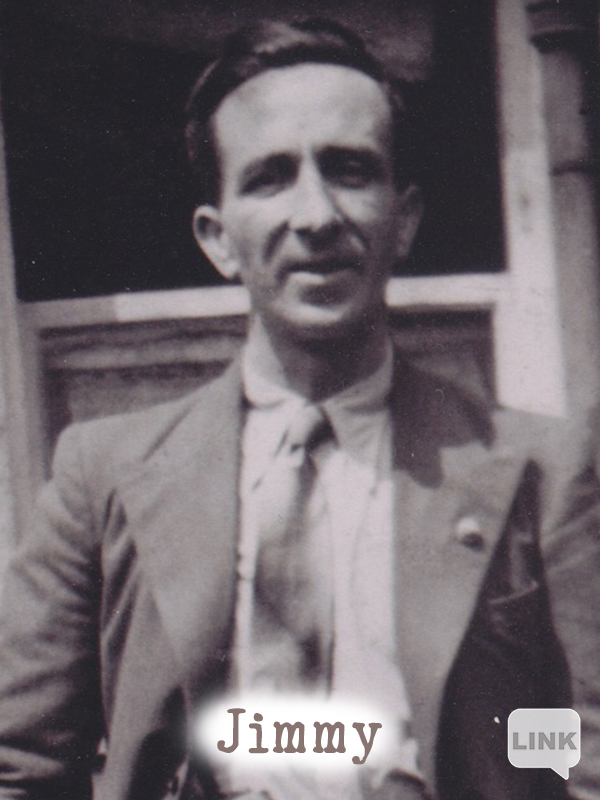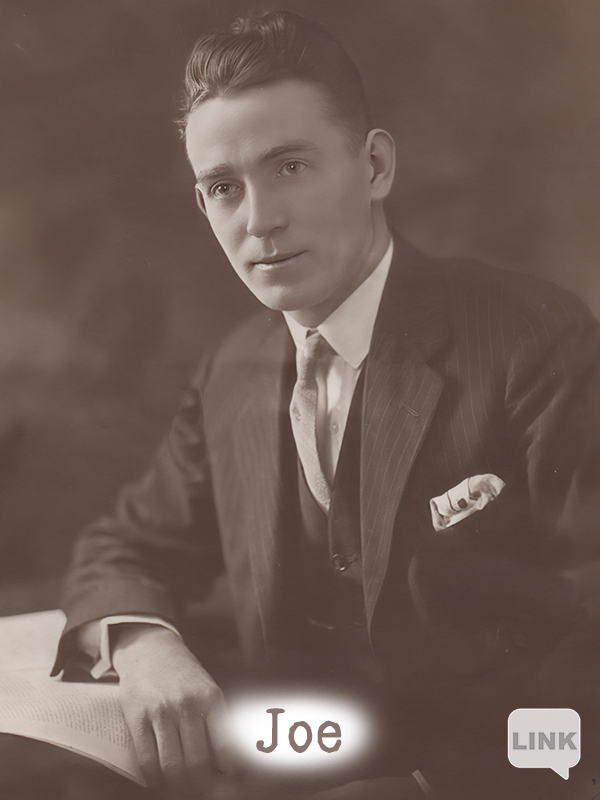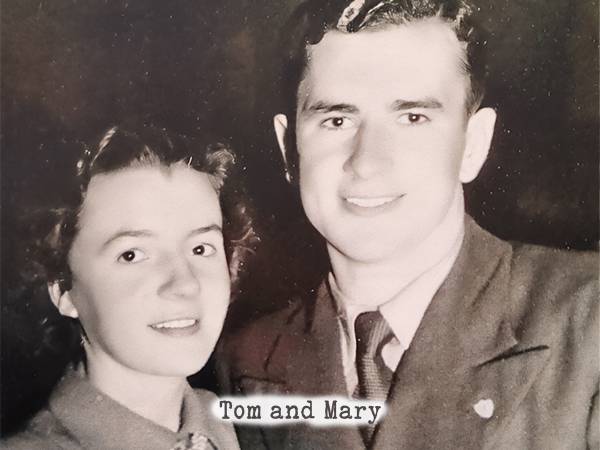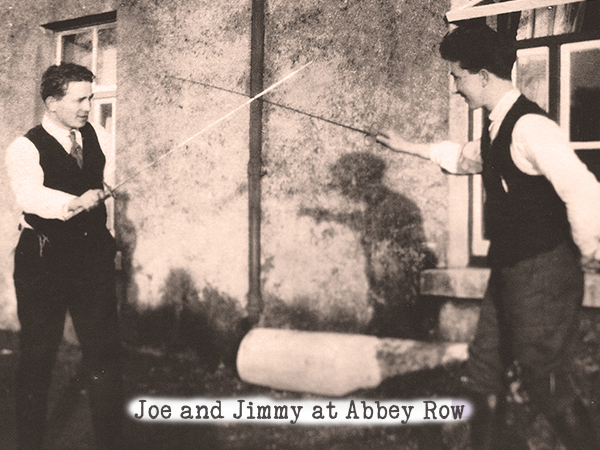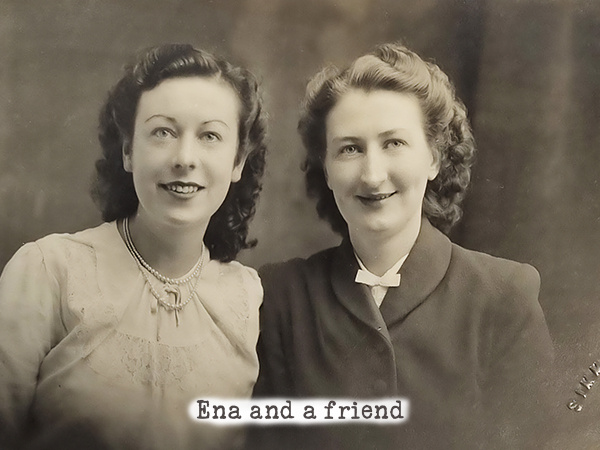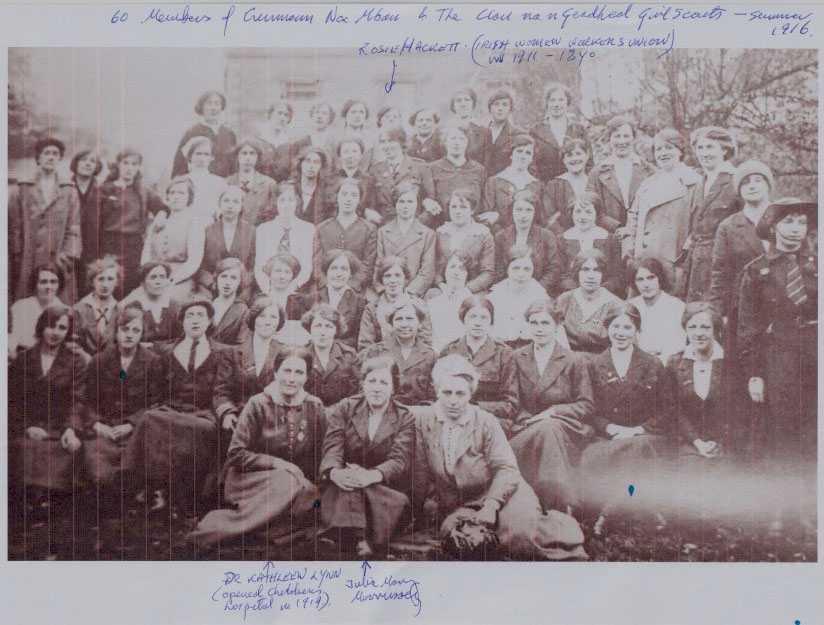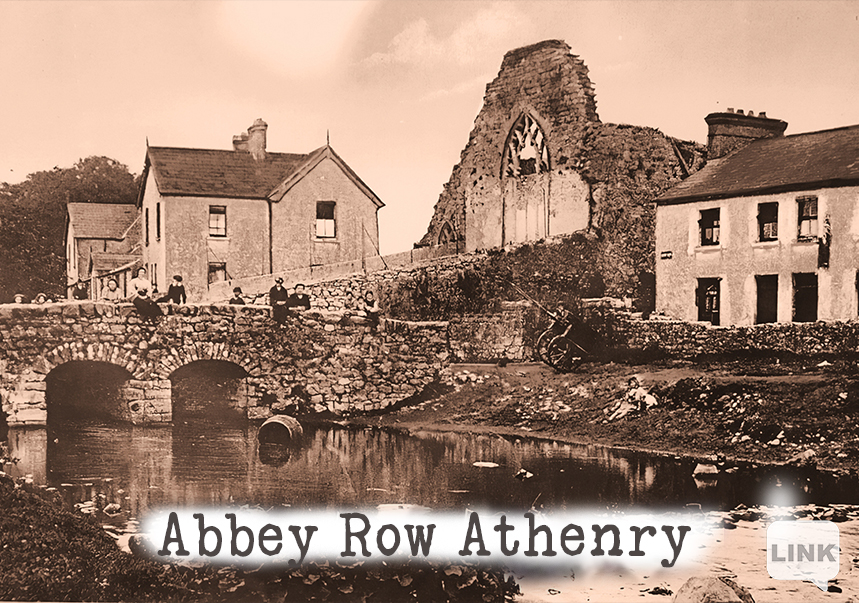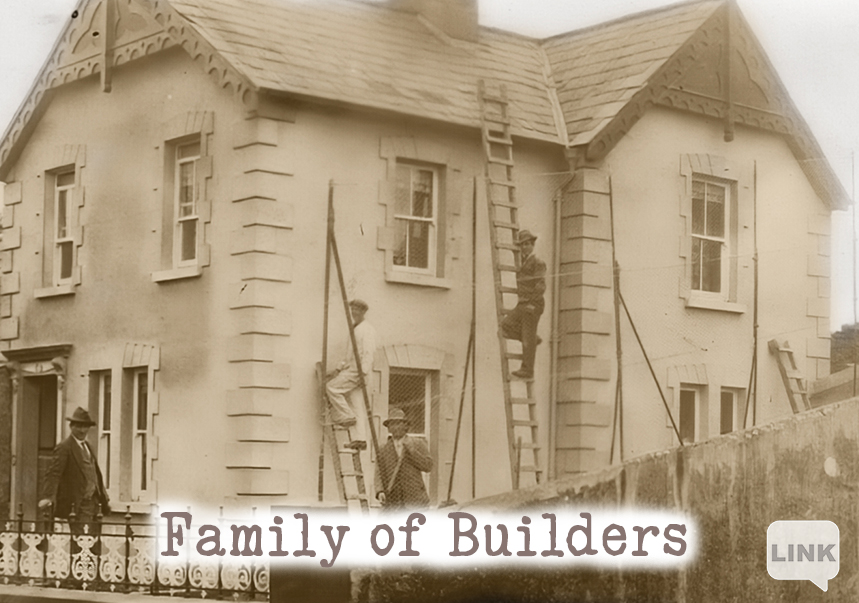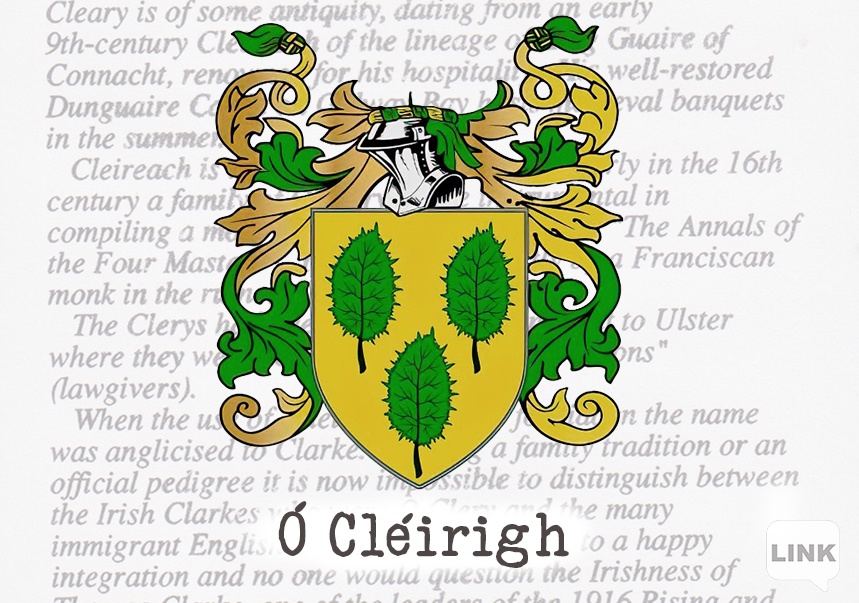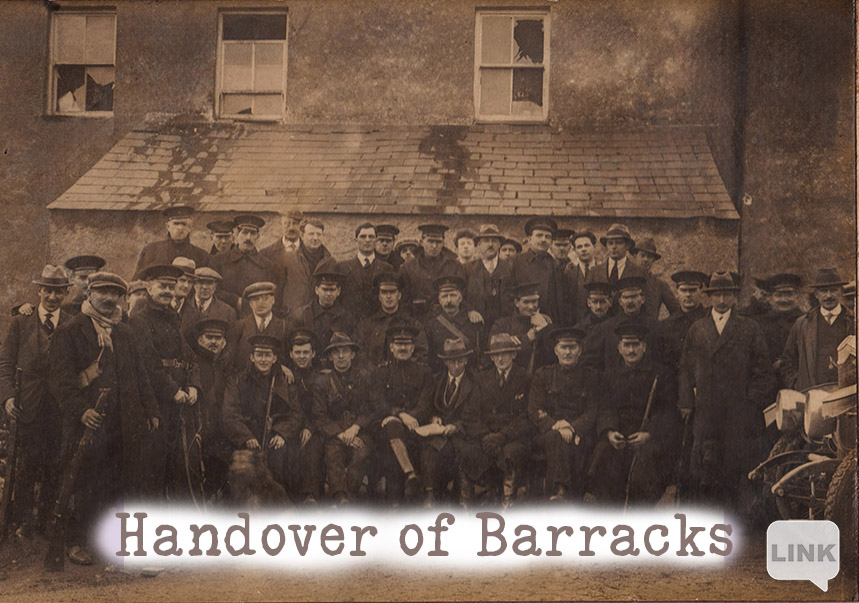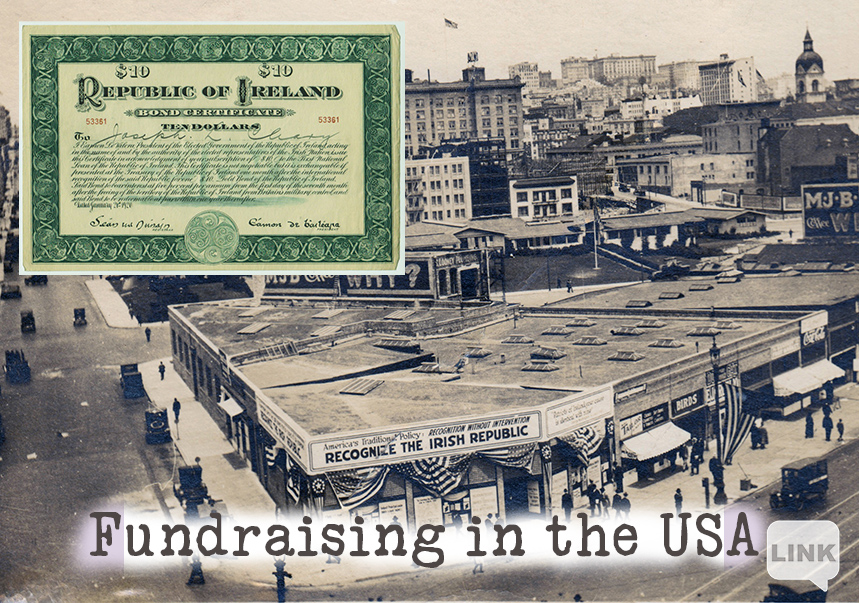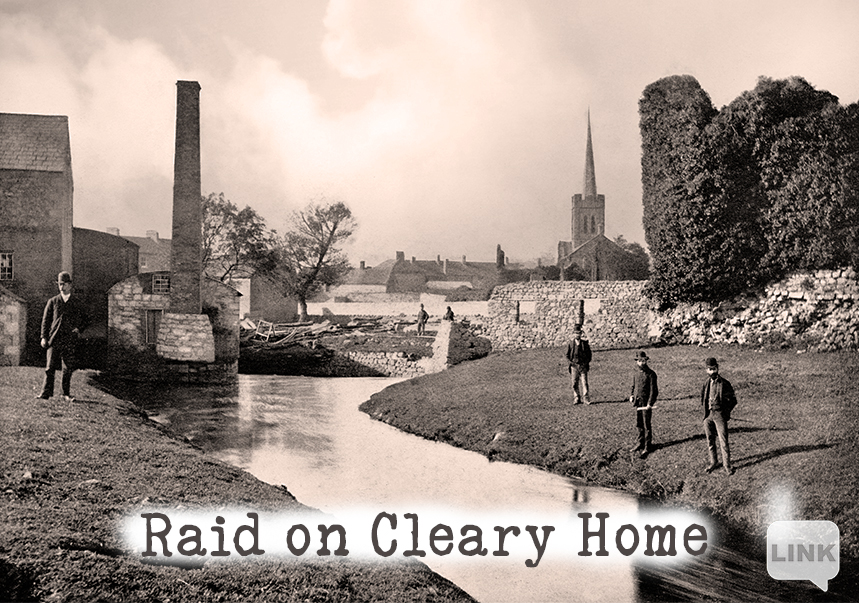| Letter from Joe Cleary October 1919 |
|
Thomas B.’s son Joe left Ireland in 1919 and traveled to New York. He did so in order to avoid prosecution by the British establishment for attempting to murder an R.I.C. Officer at a political rally in Loughrea. He initially lived with Liam Mellows in New York but was homesick all of his time there.
Liam Mellows, Eamonn de Valera and other political leaders were very active during that time in the United States, particularly in New York City. They travelled across the entire country gathering support for Irish independence and raising funds for the cause. Joe was still a young man and wanted to earn money and get established in the U.S. In letters to his father he gives a great insight into his political concerns and his constant yearning for information from home. He also wanted to ensure that the people at home were aware of how the political situation in Ireland was being presented to the American public, especially in newspaper articles. He was always concerned that the family at home were doing the best that they could financially and politically but also personally. His letters always referred to money enclosed by him to help the family
|
|
Dear Father
I received your cards alright but felt a bit disappointed in not getting a letter, but I can understand well that you are not in the humour for writing letters very often. No matter, I know well that you will write when you can. I wrote you a few and sent on a few papers also. I wonder did you get them and some to Larry (Lardner) also. I will chance another now, but I'm afraid this strike that's on in England will hold them up. We can sacrifice that much as long as it is doing good work otherwise. If they only hold out a little longer what a great deal of good they can do for Ireland. Things seem to be getting a bit hot at home and I think they will be worse.
Although everything seems to be going very well here the President (Eamonn de Valera) and party left here last Wednesday on the tour through the states for this Irish Liberty fund or rather an “ Irish Liberty loan drive”. He is asking for 10 million dollars, they expect to get it easy. Liam (Mellows) and the publicist are gone on ahead arranging things for them; they wont be back in New York until Christmas or around that time. I think that will finish them up here. Then for the next move we must wait and see. However, I must wait and see too. I could get a start at the trade but it is not worth my while for the present anyway I would not make as much money at it during the winter as I would at the job I am in. That is not saying much for any of them to put it in a nutshell New York and I can say America is on the turn. labour is no way organised ,one watching to step inside the other. Where I am they had a strike half went out and if they did not come back quick they could stop out. Where is the democracy here? everyone for themselves. You said you are going to remove the huts. It's too bad that you had to do that. It's alright but don't kick Jimmy there - but as little as you can. It is a pity he is not at something. If he was here he could get a four year Collegiate course free. I'm sending him a college card. So if he sticks at his lessons for a while there may be a chance yet. I wasn't in Philadelphia for the past three weeks. I would go often but it is very damp. Anyway, I am looking for Pat . I would like to see him. We may be able to get him, I hope so. How are the potatoes? This seems to be a good year for them. The ones here are rotten compared to ours. Slan for now and I will write again in a few days I am sending you the Irish World.
I remain your son
Joe
|
| Letter to Jimmy In Portlaoise Prison 1922 |
| Thomas B wrote to Jimmy who was interned in Portlaoise Prison in 1922. He was only 21 years old at that time and in the letter his father was certainly trying to raise his spirits. |
|
Dear Jimmy When I wired to you I was on my way to Galway. I know full well that you missed the letter that I said was following well, it didn't go and therefore you didn't get it, but I think you were not neglected by the others at least I heard so. I was making a dive for my “patron saint" that day but he was not at home. He was on his first holiday in 12 years. He is not back yet and that means a lot, but of course there is no reason why things should not be alright. There is great work about the release of the prisoners but I am sure the prisoners are the least put about. I don't think I will take any part in the forthcoming election by way of speaking because there is a reason and many reasons why I should not. I have accepted a ballot box from Larry (Lardner) and it is a pity you are not out to do the Clerk. I think you've done it once before. There are great changes since you people were interned you will scarcely know the country when you come out. You asked me one time about certain girls who were shot or wounded in Castle Lambert. Well, I think there is a trial about it this week but I ought not to say more. Jack is, I think, working in the engineering section of the army. He has the two Walsh's somewhere around Tuam or in Tuam. Joe will be at his house the moment Johnny comes. I have a very fine design for it. I think Johnny is to be down next week. He is trying to square with Longford County Council for the next meeting. Joe looks alright but he shows up a bit thin and very quiet. In fact he has a serious aire about him. It seems the big responsibility of his job has told upon him. I christened 10 children. You are the youngest when he has a like number I'm afraid his step won't be as light as his father's. However, he is all right. Three of us were at the races the first day Joe did not come home he met friends from Eyrecourt. I went the second day but did not meet him either day and came home stoney broke. So did everybody. You need not be sorry for the races. The second day was wet and stormy. I was in the tent getting a drink myself and Michael when the whole canvas went west. We looked out and several others were in different stages of destruction. Barrett the tumbler was doing his bit trying to save one just by us. He was up on a rafter trying to loosen a nail. A squall came and he was very appropriately found in a bath of Porter.The evening cleared and they all sold out without a roof. Joe was very anxious to see you but he must wait. Things must find their level. Jordan and a few others are trying to reorganise the GAA but there is no heart in it and the gate does not pay. Johnny Whelan got stuck £8 at the sports brought off in June. They are trying to get some kind of races in September but I think that will finish athletic sports here for a while. Tommy has Clancy's advanced towards completion. Mr Glynn's son is home from Rome and a very fine young fellow he is. There is nothing extraordinary to tell you things are quite normal. There are no fairs owing to the post-strike. Pat and the misses are quite well. Michael was with me all the first day of the races. Thank God we performed 12 stations between the bookies and the tents. There is none of them like him yet. Did I tell you that Larry Cohen was married to a girl named Shaugnessy from Ballylynn above Craughwell. I think I told you that it is Jack that has the hill this year and Mike Hession has Gorteenacre. I have not heard a word of the Dublin business since but I know well that I have friends in the Works office and that nothing will be done without I being made aware of it and you know I offered a big price if any man gets it - I will ! so I have strong hopes for you because if it comes it is yours !! ( this refers to TB buying Land With the intention of giving to Jimmy later ) |
Thomas B. in his own words from a hand written statement made by him in 1936:
“On the night of the Rising I was appointed to take charge of a party to carry out railway and telegraph wrecking. Athenry is the junction for Limerick to Sligo and Galway to Dublin. I was told to pick suitable men from the volunteers. I selected Michael Walsh a carpenter, Michael Kilkelly a railway man and Michael Hession a businessman. Adjutant Richard Murphy gave me a parcel of 6 pieces of fuse with dynamite and detonators fixed.
We brought tools from the railway men’s tool shed and went out along the Dublin line for about a mile. The dynamite was a failure so there could be no second attempt, so we took out a rail some distance away and cut and telegraph poles and wires.
It was now 1.06 a.m. on the way back we hid the tools at the junction of the Tuam line. I wanted to change two men, Walsh and Hession, who were anxious to get to their base. A ganger on the Tuam line was waiting until I returned for him. He and a volunteer named Higgins came with ganger Shaughnessy and myself and Michael Kilkelly. This time all the men at outlying police stations were converging on the town. All fully armed. A bus load of them were coming in from the Ballinasloe direction.
The road from Ballinasloe is fairly close to another road and railway from Dublin to Galway. Half a mile from Athenry the two roads are within about 400 yards apart. At this point from where we were standing the big car with its lights pulled to a standstill. We could hear the words of command for the men falling in. I decided to fire my rifle over them to delay them which it did.
I at once dispatched Michael Kilkelly to warn Commandant Larry Lardner. I did not know that the volunteers had left for the Department of Agriculture and Kilkelly had to follow. About three quarters of an hour from that we were again cutting Telegraph poles on the Tuam line when Higgins, who was on guard reported to me that two men were in the field on the other side of the railway line. In the semi-darkness we took them for policemen. I fired a rifle shot across them and they dropped from sight. We proceeded farther where I own a bit of land and a sandpit.
While working again they hailed from the pit; they were M.Tracy and P Gannon both railway men and our still employed there. They recognized my voice and wished to fall in with us. I sent them to headquarters. They were volunteers on their way to headquarters after damaging the railway line up near Attymon station.
My men and myself were back again in town at as near as I can go at 3.40 am. We did some scouting and found the RIC digging themselves in and boring port holes in the barrack walls. They also took possession of houses nearby. They placed men in patrols of fours and sixes. I went home for something to eat and proceeded to the farm about 4:30 a.m.
I proceeded along the railway line and about halfway I met volunteer Martin Hynes armed with a rifle doing outpost duty. His wife was dying of consumption leaving five very young children. I told him I’d see Liam Mellows and Larry Lardner about changing him they having scores of younger men. I met two more quarter miles further on. One of them, my own son, the other Michael Gardner. We are at this point about 100 yards from the police Hut and an exchange of shots took place between our men and the police.
I entered the farm from the railway line. There were quite a number of our men undercover on a high wall. I proceeded up the yard towards the firing party. A motor car was standing in front of me five yards off Lieutenant Hynes shouted to me that a motor car has no cover. I pointed to the northwest and said there are a number of men coming across the country they may be enemies.
I notified other officers also and the line was manned but the strangers proved to be volunteers. Liam Mellows had not yet arrived from the west; there was no more firing. I met with Adjutant Murphy and we walked around the camp. He then told me he wanted me to write something that he wanted to put on record regarding his business and to take it to his stepmother at Athenry Hotel. He lived there and wanted some family arrangements made. We retired to the gardener’s house and when my job was done Mellows was landed.
I met him and Commandant Lardner and we talked for some time. Liam Mellows said he was hungry and after giving me some further orders he left and Lardner and myself discussed a good deal of matters. I asked for at least one young fellow and a bike but he said they’d be too remarkable - manage it some way. The management was to collect all loose ammunition
and have it sent to camp, to watch the town for a fear of looting and to keep headquarters informed of everything of interest “just use your head” .
Word was passed to me the morning after that I was to be shot at the first opportunity. The answer I gave to that threat was to find a priest and bring him to the church for confession. The Priest tried to get me to go somewhere for a while. I refused to and the Priest was only halfway down the street when a policeman had me at the point of a rifle. I defied him but the man was a coward. I then left after warning him that I would be there again in 15 minutes and I was but he wasn’t. Father E McGoff is still in the diocese of Tuam.
That evening I sent a parcel of 303 ammunition and three dispatches to the camp by a neighbour who used to work for me. I appointed a patrol of three old men to watch the town, neither knew the other was appointed. One of them came to water a horse. I was hiding nearby he said to me that old Doherty is damn busy. I can’t trust that fellow. He's squinting after something - Doherty was my best man.
Now by this time flying repair gangs were at work on the railway and telegraph services; an engine with carriage and filled with military personnel came from Galway to test the line. A false report was sent to Moyode that a train load of military with Canon had arrived at Athenry. A message was sent to me for the truth or otherwise of this - I sent a dispatch stating the facts.
Now the police were getting bold and the streets were cleared of even small children. Loyalists of course could do what they liked, this included a policeman’s children who broke into the townhouses and also the property of Captain Murphy. The floors were torn up looking for arms. and chairs were taken away. A fire was lit in one of the properties and some chairs burnt.
I was then helping and relieved to go to Moyode to render an account. As I was going in the front gate the last of the volunteers were going out the back gate nearly two miles between the two gates. When I entered the yard I found two volunteers there, both were named Walsh. One got leave to go home to lock up his place and was now just returned. I wrote a dispatch and sent him on with it too Lime Park. The other Walsh got a bad foot he jumped from a wall and a rivet in his old boots pierced his foot and poisoned him - I took him home to a doctor he got right in time and is now drawing your pension.
There is little more to be told until I was arrested “the first and worst” said head Constable Callahan. I could also say my two shots were the first in the west and I carried the first rifle in the West.
Out of this statement I have of necessity left out scores of incidents that might prove important if I have an opportunity of stating them. They can all be testified by unimpeachable witnesses either by direct examination or by affidavit. Of course death has taken away a great number of important people. but enough remains of men whose word will not be doubted. At this point I hope I will be pardoned for calling attention to my examination before the pensions board at Griffith Barracks Dublin on April 6th.
I then stated that I was not satisfied with my examination. I asked if I could send on more evidence. I was kindly told to send any amount the more the better.
When I came home, very wise people told me to leave my papers alone. They were filed under the direction of my supervising officer but as I asked for the return of certain papers I handed in and they have not yet come. I decided to make this application regarding Easter week.
I have also recorded some incidents in the Black and Tan period. Details are not easy at this length of time and big things are easy to tell. The Black and Tans of course always acted on the tips given by RIC men.
A lorry load of Tans came out from Galway to Athenry and with three or four others that were stationed here and also five or six peelers (14 in all ) broke into my house at 1:00 a.m. July 2nd 1921. They took me out. My daughter fought to hold me. My wife fainted and my dog attacked. They strove to shoot him and between dogs barking women screaming and Tans shouting and shooting hell was let loose.
I was backed in against the wall and they ordered me to say my prayers. I said it was cowardly to shoot me or give the order in the hearing of my wife and daughter. They obliged me by taking me or rather kicking me 10 or 12 yards further under the school teachers wall. The same things were repeated there. Another protest and I was taken to another place. The teacher Mr John Whelan will bear witness. Himself and his wife teaches at Newcastle National School County Galway I was then taken to the mill dam beyond the town. I was drowned and pulled through the river several times. A man at this point came into the river up to his hips. I couldn’t know whether he was a tan or a peeler.
He grasped me by the hair and put me under the water and held me there to the point of suffocation. I was then pulled out and questioned again and again. Who burned the cricket pavilion, who was the corpse found in the burning ruins is it not your own son this was repeated over and over but a scotchman one of the tans interfered on my behalf. I was then pulled out. They carried me across the field to the public road and they told me to go home. I said I wasn’t able and so they left me after two hours and 40mins of torture.
I took an action for £1,000 . It was afterwards turned down by the Free State Government who took over the "personal damages” while the British retained the “damage to property”. The British paid me £15 for the damage they did to my house that night.
Every detail about this can be had from Mr. L. O’Dea solicitor Galway who had charge of my case, Mrs. Hogan and Shields had charge of my son’s case. Was it because I was inactive in the struggle?.
Many other incidents were covered by me over so much time and so much ground that I will only give a few incidents. In the escape from Galway goal a man named Courtney got a bullet through the arm he was lying wounded and sick on the Black mountain side of Moorpark - I got a nurse and other requirements bandages etc.
I will now discontinue this line of evidence. I don’t know what its value is except to prove that I was always there, always ready and willing to act and did more than any man I know around me. And now Sir let me say with grace and respect for your judgement in this matter I do not see how I can be refused the benefit of the Pension Act.
If you still consider that I do not come within the scope of the Act I hope you will give me the right to appeal to the Minister.”
Yours faithfully
Thomas B Cleary Athenry
Extract from Sean Broderick statement
Seán Broderick was present at a meeting in Athenry in early 1914 at which the volunteers were started. His father John Broderick, Building Contractor, was elected President. Thomas Cleary was elected Vice-President. Two parades a week were held and they were drilled by reserve NCOs of the British Army. Shortly after the formation of the Company elections for Company Officers were held. Larry Lardner was elected Captain and Frank Hynes was elected Vice-Captain. Seán was elected Lieutenant.
Extract from Frank Hynes Statement
The police, instead of preventing us from carrying rifles, used to stand at the barrack door as we marched past, and even shouted words of encouragement to us. We knew what the idea was – the English Government thought that we would be available when they wanted us. I forgot to mention that when the split came we didn’t even discuss it at our meeting. Two old members of the council resigned; they were old Parnellites, and had great faith in Redmond. Of course, most of the milk and water Volunteers who joined when Redmond took over left us too.
The next item of interest was the celebration of the Manchester Martyrs’ anniversary. We called a meeting of the company officers to discuss the matter. The day happened to fall on Sunday and there was a question of discharging firearms in the public streets on the Sabbath. We decided on firing the three volleys and make preparations for the peelers if they tried to stop us. We had the company on parade in the drill yard on that Sunday night. It was pitch dark and we had no lights in the yard. One of the officers went round amongst the rifle men and handed each one three rounds of ammunition. They didn’t have an idea as to what we were going to do; the whole thing was shrouded in mystery, hence the darkness.
Before we started on our funeral march round the town, I addressed the men and thanked them for the respect they had shown me as their captain, also their strict obedience to my commands. “To-night”, I said, “your courage and discipline may be put to the test, so I want you, no matter what happens, not to do anything until you get orders from me”. This made them sit up (as it were). I gave the orders “reverse arms, slow march”, and we marched round the town past the barrack to the place appointed, we fired our three volleys and needless to was like a terrific explosion in the silent streets. We waited some time to see if the peelers would come but there was no sign of them. Then we went round the town again at quick march and everyone felt very satisfied.
Thomas B. in a sworn evidence statement applying for a Pension in 1945
“I was a member of the Irish Republican Brotherhood and twelve of us started the Irish Volunteers in Athenry. I was a member of the IRB from 1881. I was sworn in while in Mullingar jail for land leaguing. I later forced Larry Lardner to start the volunteers.
I paraded in the town on Easter Sunday with a rifle and revolver. Before 1916 we sent to Manchester for arms. I left my job and came back and took charge of them. On Easter Monday in Clarks Lane. On Tuesday night I took charge of a party to wreck rails and knock down telegraph poles. I was responsible for the Dublin and Tuam lines. Two men came across the fields. I thought they were police and I fired on them and they dropped. There were no shots fired at the police that time.
After the scrap with the police I was sent back to Athenry to investigate looting. I spent Wednesday night in Athenry. I was told I’d be shot on Thursday. I went to Moyode. Before I went there I collected all the arms and ammunition I could and sent them to the farmyard. I was sent back from the station to Athenry. I took charge of a man named Martin Walsh that had a blood poisoned foot and had to get into a doctor. When I got rid of Walsh I went to my house as it was late and there were a lot of rumours.
I stayed in hiding and was caught on Saturday morning. My gun was hid in the Abbey at the back of the house. I was heading for where the rifle was hidden. My house was raided during the week so I wasn’t there. I was Arrested and interned in Stafford Frongoch and Wormwood Scrubs and later released at the end of August 1916 by mistake from my son.
Rejoined on reorganisation - house raided by Black and Tans and beaten, fired over three times. I was a member right up to the truce but I wasn’t very active. I didn’t take a gun from the British Sergeant, a man with me did. O’Reilly took a gun from a British soldier. I took possession of it and gave it to the parish priest who gave it to the military.
Not in any camp or Barracks during the truce
Arrested and detained for a while in The Railway Hotel in the civil war no activity of any consequence
(note some comments in the statements are in abbreviated form by TB)
Extracts from a sworn statement made by Thomas B Cleary before an Advisory Committee on the 6th of April 1937
Q: When did you join the Volunteers
A: In 1913
Q: at the beginning
A: Yes I’m amongst the crowd in the photograph who had that started before the official time
Q: Are you still in the Volunteers at Easter week
A: Yes
Q: Had you any rank
A: I never accepted a rank I was an organiser all the time
Q: Were you are armed
A: Yes
Q: What arms had you
A: A Rifle and a revolver both were my own
Q: Were you dismissed
A: Yes amongst us there was no such thing as dismissal it was duty to a finish and we were in charge of everyone who was there
Q: You were sent home
A: We were not sent home. we were doing whatever work was necessary in the way of getting reports and dispatches to the others outside it was not easy in a country town where we were outnumbered
Q: Did you spend Sunday night at home in your own house
A: A portion of it I was at home most of Sunday night
Q: On Monday morning did you mobilise again
A: I had four sons and two daughters in the Rebellion
Q: What happened on Monday
A: It was the same thing again there was another dispersal by a message that came from Dublin
Q: Where were you on Monday
A: I was in the Volunteer headquarters all day on Monday and on Monday night as well I was there all night
Q: Where was Headquarters
A: It was Clarke’s Lane which is the Town Hall presently it was I built it, I was after building it
Q: You spent the night there
A: Yes
Q: Did anything happen on Tuesday
A: They were getting into uniform
Q: Where did you spend Tuesday night
A: I spent all the night rail wrecking
Q: That was the first activity
A: Yes and cut in telegraph poles
Q: Were you out all night on that job
A: Yes, I had three railways to attack I got a cup of tea about four o’clock in the morning I went to the Department’s place about four or five o’clock on Wednesday morning
Q: That was the model Farm
A: Yes
Q: What happened then
A: Then Wednesday I went up to Commandant Mellows he said he would not interfere with the police except they interfered with us
Q: What kind of clash was it with the police was it that the police came to attack the volunteers
A: There was a barracks there I think it was our people fired the first shot
Q: Did you do any firing in that yourself
A: Not at that particular time I was too much in the open and had no protection
Q: After that did you stay long in the farm
A: I think it was about nine o’clock when I left the farm
Q: Where did you go then
A: I went to a country cottage of the department to write the will of one of the lieutenants of the volunteers
Q: Where did you go to after that
A: After that I proceeded on the instruction of commandant Mellows to put a few people together and to parade the town and keep an eye on anything in the way raiding also to keep them informed
Q: Your job was to see there was no looting
A: Yes and everything that was useful and to send out all the ammunition that I could to them or any class of equipment
Q: On Thursday did anything happened
A: I sent two dispatches first to Moyode and I followed out with the third
Q: You followed with the third dispatch
A: Yes
Q: when you got out there did you stay there
A: I walked there and they were preparing that time to go to Lime Park
Q: Where did you spend Friday night
A: I spent that night in the open I did not go home in any case
Q: Was that the finish of it
A: When I did approach my own place I was arrested
Q: When were you arrested
A: On Saturday morning I think
Q: You are approaching your own home when you were arrested
A: Yes, I was told to clear out of the country
Q: Was it police that arrested you
A: Yes I was told by a publican who was intimate with an ex Head Constable that I would be shot at sight
Q: You are brought to Galway
A: Yes
Q: And then to Arbor Hill
A: Yes
Q: And Stafford Wormwood Scrubs and Frongoch
A: Yes
Q: When did they let you out of Frongoch
A: Some time in August
Q: What time
A: The middle of the month
Q: Before Easter week were you taken out for any special job?
A: I was always an organiser if you read that history you will see that we were a well-organised body I am an old IRB man
Q: You were able to attend to your own business before Easter week you did not stop your business
A: No, but whenever the country’s business called it took precedence
Q: March 1920 you assisted an organising and making plans to attack on Moyvilla RIC Barracks did that attack come off
A: Not the first time it failed through two companies not synchronising
Q: You claim you assisted in making the plans
A: Yes, I was planning everything
Q: assisted in Capture of British military bicycles at Athenry Railway Station is that right
A: Yes
Q: Were you in the raid yourself
A: Yes
Q: Assisted in disarming a British sergeant in Athenry
A: Yes
Q: How do you do that
A: By walking into him and collaring him I asked the police patrol to arrest him before he would shoot - and before anyone who was afraid to get off the street - that I was not afraid , I saw two sons of my own, I got him and one of my own boys took the revolver I told them to take it away
Q: Were you armed yourself on that occasion
A: No, because I was only walking up the street when I heard shooting
Q: Acted as military picket at Athenry to prevent British military or RIC travelling on trains
A: Athenry was the Terminus that time
Q: Were you in any fights in the Black and Tan time
A: I was
Q: You were not in any ambush yourself
A: No, I forgot to state that in 1916 I fired on them twice it was about a half a mile from the town they were going into the town
Q: You were raided taken out by the Tans and badly beaten
A: Yes, I was kept two and a half hours under torture
Q: They did not put you in goal
A: No, they pulled me across the fields and then one of them whispered to me not to go he was fixing me up against the wall when he whispered to me
Q: In the Civil War time you were arrested by the Free State Troops and your house raided several times
A: Yes
Q: Did they put you in goal
A: Yes, in Athenry
Q: For how long
A: A day and a night I think
Sworn statement made by Thomas B Cleary on the 20th February 1945
Q: How old are you
A: I will be 86 on the first of May
Q: When was your first connection with the movement
A: The Volunteers of Athenry were started by the I.R.B. and I was a member of it and twelve of us started the Volunteers in Athenry
Q: When was that
A: In 1914
Q: When did you take the oath
A: In 1881, I was sworn in Mullingar goal in 1881
Q: What were you doing in it
A: Land leagueing
Q: Were you in goal for land leaguing
A: Yes, and the organisation started in the goal and I was a young fellow in the goal and I was called on by John McCarthy of Loughrea who gave us a lead in every political movement that was against England, and when the volunteers came along we led in that as I started the volunteers. I gave notice to Lardner and Broderick and they started. The P.P. was against it and they were friends of his and they were a little bit slow in starting but we forced the pass
Q: Were they also members of the I.R.B.
A: One of them was the other was not but became a member after there was a meeting held in Loughrea and all the young fellows were all re-sworn
Q: When was that
A: That was somewhere in 1915
Q: Had you a rifle and a revolver
A: I had both
Q: They were your own
A: Yes, the rifle was my own belonging to the company but it was myself made the rule one man one rifle
Q: Before Easter week in 1916 had any arrangements been made to obtain any Arms
A: Yes, there were
Q: From where
A: We sent to Manchester for arms and I remember I was in the Aran Islands working when the invoice for them came and my own son notified me because the priest wanted us to hide the arms when they came. I was afraid that the arms would be secreted somewhere and put away from us before we got a hold of them so I left my job and came back as soon as I got word. We got them to the Town Hall and it was myself open the case and as soon as I open the case I just took a gun out and said “one man one gun”
Q: Were you up in Clarke’s Lane
A: Yes
Q: Did you spend the night there
A: I did not actually spend the night there but I did not take a boot off my foot-working
Q: Did you go rail wrecking that night
A: It was understood always that I being a tradesman would take charge
Q: Did you take charge of a party to wreck rails
A: Yes
Q: And did you cut down telegraph poles
A: Telegraph poles, bridges and railway lines - one going towards Tuam and one going towards Dublin and one going to Limerick and one going to Galway
Q: Do you remember Liam Mellows getting up on a cart and making a speech at Moyode
A: I do but that was after
Q: Were you there
A: No, I was not there at that time
Q: Why
A: I was sent into Athenry again after the scrap with the police, I brought word myself that there was some looting going on in Athenry
Q: You went to investigate
A: I was sent in to investigate I don’t want to be boasting but there are some parties who were afraid of me - I was sent in to investigate and if I could not stop this thing I was to send a dispatch and they would send a party to settle it
Q: How long did you stay in Athenry
A: I stayed there that evening and that night
Q: When was that
A: That would be Wednesday
Q: What about Thursday
A: Thursday, I got word, an ex Constable told a friend of mine, that I was to be shot at sight by some members of the Constabulary to get him off the street that “he would be shot on the street” so when I got that word I went to the priest. He is alive yet -Father McDonough - so I got confession. And after that I took up duty then. And I did not go more than 50 yards from the priest when a rifle was put to my breast
Q: Did you go to Moyode
A: Yes, I collected arms
Q: What were you doing when you were caught
A: I was trying to cross the river, not by the bridge
Q: Where was the gun
A: The gun was hid in the Abbey
Q: Where was The Abbey
A: It was just at the river I was going to it. There was a tower with a policeman on it and his sight would overlook my back premises and he spotted me but it was not he that arrested me but another fellow
Q: Was the river at the back of your house
A: No, right in front, my house is there and this is the Abbey , that is the tower he was up on the tower and he spotted me here ( indicates ); the road to Lime Park is off that way I was heading for where the revolver was hid and the policeman cut in across the Abbey he must have been sent after me because it would lead to nowhere to the Abbey
Q: What were you going to do then
A: I would not surely stay in my own house because my house was torn inside out, the floorboards and everything
Q: Afterwards
A: Yes and even at that time it was raided day and night
Q: What were you by trade Mr. Cleary
A: A working builder, I was a plasterer by trade I had four sons working and I had to turn working Builder
Q: And then went back to Athenry
A: Yes, but before I went to Moyode at all I collected all the arms and ammunition I could. I sent the ammunition by a man who was not an organised man at all, to the Department. When I was sent in by - I was told to look for a revolver by Liam Mellows, it was on a loft where there was a ceiling in course of erection and I was told I would get it there . It was a ladies revolver I had in my possession as well as my own. I gave it to them at the Department
Q: Where was this gun of Liam Mellows
A: In the Town Hall in Athenry they told me where it was and to take possession of it
Q: You have the Town Hall occupied for portion of the time
A: We had but we left it then we locked it, the Department is the agricultural station, the policeman’s sons and others they attacked the Town Hall
Q: You were sent back from the station to Athenry
A: Yes
Q: Were your four sons involved
A: They were, I was the only man in England with four sons in jail in England and two daughters in jail in Ireland all my business was smashed up that time and I never got the use of my right hand since, I’ve never done a ceiling since
Q: When you were arrested you were taken to Galway
A: Yes
Q: You were brought from there to Arbor Hill
A: Yes
Q: From there to Stafford
A: Yes
Q: From Stafford to Frongoch
A: Yes
Q: Three weeks in Wormwood Scrubs
A: Yes (Handed in Photograph)That is the working committee of the volunteers it was myself that organised them after coming back there were some papers and documents handed in before
Q: Is there any other man besides you in the I.R.B. who had your sort of service in 1916
A: Steven Jordan is an I.R.B. man
Q: Would you be the only one of the Old Guard that is left now
A: There are a few decrepit old men
Q: Was there only one in Frongoch with you from the Old Guard
A: You mean anyone in the I.R.B. as long as I am I think there were, old Broderick and Irwin
Q: When were the IRB reorganised you were re-sworn at one stage
A: Murphy was always reorganising them and swearing them in I was only sworn in Loughrea by winters
Q: When was that
A: In 1915 I think
Q: On one occasion the black and tans had you against the wall
A: Yes I was beaten, drowned and shot three times
Q: Shot?
A: Fired over - said it was a shame to give that order in the hearing of my wife and daughter the dog came and attacked them they fired about 40 shots that couldn’t get him
Q: Were you a member of the Volunteer company right up to the truce
A: I was but I wasn’t very active if there was anything important I wouldn’t be away from it
Q: But you sent order not to go to the drill
A: There was an order came from Dublin about forming fours, that’s all that was necessary for gorilla warfare
Q: Where had you to work
A: I had to work in Mayo
Q: When did you leave the district
A: A few months after I was released I did a little work in Tuam Parish But I did a good deal for the County Council I was in charge of the Tuam Court Houses for about 13 months
Q: Did you disarm a man in Athenry - a British Army Sergeant - one time
A: I didn’t but there was an incident a man was with me took the gun from the sergeant it was a useless act the fellow had drink on him and there was no purpose served
Q: Did one of your boys take the revolver from a soldier
A: I helped him
Q: Was the fellow drunk
A: He was
Q was he making noise
A: He cleared the streets several times when I was coming up the street. I complained to a sergeant and three constables. This soldier was called the “boar" Why are you standing there with this 'boar' running around the town? I asked them. The sergeant said anyone who was afraid of him let them leave the street the 'boar' was attacked by a man called Reilly and as I closed in too I got his revolver hand behind his back and then I got hold of his stock and held him - Rielly struck him and then I let go. I was going to strike Rielly and I said not to hit him when he was disarmed. The Boar was too strong
Q: What happened to the revolver
A: I took possession of the revolver
Q: And what did you do with it
A: I gave it to the P.P.
Q: The other fellows knew you had it
A: Everybody knew it for the people coming from the Rosary saw the attack and I just wanted them to see I did not attack the soldier for the sake of his revolver and I said that the revolver has to go to the police. That it was not any good to me I gave it to the P.P. and then the PP wanted to give it to the police I would not allow him, and I said the police when appealed to ran away and they were not worthy of it, you can give it to the military if you want to
Q: Will this be fair to you that the time of your most effective service was before 1916 and then during 1916 up to the time you were put in goal
A : Yes
Q: And you left it to the young fellows after that mostly
A: I did not ever leave it to them. I did not leave it even now. Yes I had a young fellow that kept me in touch I had to go and do the spade work anything that will be worth coming home to I came back to I came out of the Aran Islands to do it too
Q: When the Civil War broke out did the Free Staters put you in goal in Athenry for a day and night
A: I was in goal and in the Railway Hotel I was arrested several times
Q: Had you done anything to deserve that
A: There was a recruiting officer on the platform and he stuck his revolver against me and I turned on him and I said it might be Canon Magners revolver he had. The one that shot the priest and he arrested me and took me over to the hotel, they kept me there for some time when I was let out
Q: Did you have any activities against the Free state forces
A: No
Q: You did not approve of them
A: Of course I didn’t approve of them, but if I did not itself I did not do much against them
Q: You gave them a lick of the tongue
A: No, I will not hurt a man in that way, as I would do it in a fair fight
Q: Did you have any fighting against the free state soldiers
A: I did, I met a fellow in the public house one night and I knocked him down. He deserved it if there was no politics at all. He raided the post office and went away with the money left his own Regiment and left Ireland for Ireland’s good
Q: You say that Richard Murphy could have proved it was you who ordered the Volunteers out to fight in 1916
A: Yes
Q: Is that right
A: Yes, because two dispatchers came to Athenry one from Eoin McNeil and the other from headquarters of the Volunteers. Eoin McNeil said I think not to go out as there were some kind stay on it and the police were getting hostile
Fr. Fahey wrote another letter directly to say your head and front of all national activities in the Athenry area. He says that Athenry was once described by British Minister as “the one black spot” and that this little town did its part and the credit can be claimed by Tom Cleary
Q the “ black spots” of the county were Athenry and Loughrea?
A: Athenry was mentioned by chief secretary Bryce as the “one black spot”
There is a certificate here from Mr Neilan.9 Certificate read by referee)
Mr Cleary you are certain of one thing and that is - most careful and most sympathetic consideration - I can promise you no more than that now if it is possible within the law to give you a pension I will give it to you if it can be done in fairness that is certain it is easy for me to say that that does not make you certain of a pension
A: I thank you now sir as if it came
Q: I can do no more than that
A: Thanks very much that is a payment in itself
Extracts of sworn evidence given by Mr. A. Monaghan in the case of Thomas B. Cleary to the Referee & Advisory Committee in 1945
Q: Can you remember Thomas B. Cleary
A: He was an old cranky man
Q: He is 80 years of age now
A: I remember him well. My recollection of him is, Liam Mellows was in Galway before I went. He had a list of people there. I was sent out to the midlands. When I went out first I got a list of names, some of them old men, and I imagine Cleary was one of the men because he was a cattle-driver at the time of the land trouble. So. I take it then that he was one of the older men with whom Mellows had got in touch
Q: Tell us what you can say of your own knowledge of the man
A: My own knowledge of him is that Liam Mellows was in Galway when I went there, I met the people he had selected and my recollection was that Cleary was one of the trusted men. I have a good recollection of him without having details. He was one of the men I had respect for and looked on as one of the reliable people of the place. He was much older than the rest.
Q: You were there there during the whole of the week
A: Yes, I went back to Galway after I came out of prison in January 1916
Q: And then you were in Galway continuously up to Easter Week
A: I was
Q: And you were meeting Cleary frequently up to Easter Week
A: That time I got a deportation order which I refused to obey, and then, when they came to arrest me, Fr. Feeney, the man who died there last week, visited me with another priest, and we swapped clothes, the two priests went into the house and two went out. We had swapped clothes inside and that was how I got away. The place was surrounded by the police. I went up to, I forget now, the district outside Athenry. But, coming up to Easter Week , I was in the house of a man called O'Higgins in the black mountains, Castlelambert I think. I forget the name, but I was there and I did not meet old Cleary, but of course, I frequently met him up to the time when I had to lie low
Sworn evidence given by Stephen Jordan in the case of Thomas B. Cleary at Galway Courthouse in 1945
Q: Mr Jordan I think it will be safe to say you know Mr. Cleary for a long time
A: Yes I do
Q: Will you tell the referee and the Board generally what the activities were prior to 1916
A: Well of course prior to 1916 Mr. Cleary was one of the 'old crowd'
Q: Then he was associated with the Volunteer movement from its inception
A: Yes from the very start
Q: Who put him on that work
A: Commandant Liam Mellows as far as I know or at least Commandant Larry Lardner
Q: This was the class of work he was best suited to
A: Yes, he was an expert in these things. I think he was detailed for other work and sent into Athenry he would be kind of useful in certain respects if you like in connection with secret service work as well as everything else
Q: How was he injured (a ref to Mr. Walsh)
A: He was injured in some way, really I don’t know
Q: A blood poisoned foot
A: I couldn’t say the man wasn’t fit to continue and Mr. Cleary guaranteed to get him safely home or to the town to get in treated
Q: Do you know was Cleary arrested
A: Yes and in turn I seen him in Frongoch
Q: Do you know anything more about his service subsequent to that
A: After his release he was just as active as we were
Q: How active
A: There was a reorganisation of the Volunteers
Q: He was a marked man
A: Very marked
Q: His house was raided
A: Yes, and he was badly treated himself and he was beaten by the Tans that is all
Extracts of Statement made by Stephen Jordan in 1950 a former Irish Volunteer and Member of Dail Eireann
“I joined the IRB in Athenry in 1906. The centre was Richard Murphy. Larry Lardner was secretary. Meetings were held regularly every month. The principal matter discussed at the meetings was the spreading of the Organisation in Athenry and the surrounding districts and the suitability of persons proposed for membership. Sean Mc Dermot used to attend the meetings every two or three months.
In or about 1908 a strong branch of the town tenants organisation was formed in Athenry. Although it was against I.R.B. rules to join, all members did so. This organisation by agitation and “agrarian outrages” as the British authorities called them succeeded in forcing the sale of the houses to the tenants. Also the division of the joining lands in what was then called “accommodation plots” to each tenant purchaser this led to a series of activities for the division of land in all areas bordering Athenry.
As the R.I.C. failed to get any information that would lead to the arrest and conviction of anyone they turned very nasty and in several cases framed charges against men of disorderly conduct, drunkenness etc. and other occasions carried out baton charges without provocation.
In an effort to retaliate the Athenry Branch of the I.R.B. met and decided on certain actions to be taken which would make the Police the laughing stock of the countryside. The police transport horse was taken from its stable and hidden for three weeks while hundreds of police searched the countryside without success.
After three weeks the horse was returned to the stable with a straw man on its back. A card was attached to the figure with the words “a new mount for Springheel Jack" on it. This was a slap at the over officious head Constable Neelan who was doing all in his power for promotion to the rank of District Inspector.
On another occasion the tri-color was flown from the chimney of the R.I.C. Barracks and the ladder removed from the barrack's yard. The flag remained flying all day before the police were able to remove it. The Crown was also removed from over the barrack's door and later the board to which the Crown had been attached was suspended from the Telegraph wires in the town with the inscription “£5 reward" printed on it. Practically all the credit for these and other similar incidents was due to that energetic worker the late Thomas B Cleary. He was mainly responsible for the planning and execution of all these incidents.
As a result of all these activities the I.R.B. became numerically very strong and remained so up to the year 1913 when the Irish Volunteer organisation was founded. The national spirit was so strong at this particular time owing to the activities I have already mentioned that the Foundation of a sound volunteer organisation was a foregone conclusion.
Very early in 1914 a company of Volunteers was started in Athenry. I became a member at the initial meeting Larry Lardner was elected captain of the company which was about 70 strong. Each man subscribed 3d per week.
The company was paraded regularly every week and was drilled by ex NCO’s of the British Army. A number of volunteers including myself attended practically every night for instruction so as to become efficient as soon as possible in order to assist the training of country units where ex British army men were not available for the purpose.
A review of the volunteers took place in Athenry on 29th of June 1914 at which colonel Maurice Moore took the salute. About two thousand Volunteers took part in this Parade, the military bearing of the various units was favourably commented upon and the strength of the volunteers was an alarming revelation to the British authorities.
The split in the Volunteers following John Redmond’s speech at Woodenbridge had little or no effect as practically all the company stood behind McNeil.
Early in 1915 Liam Mellows was appointed chief organiser for the county of Galway. He established his headquarters in Athenry. I accompanied him on a good deal of work organising the Volunteers. Shortly after his arrival he organised Galway on a Brigade and Battalion basis. Larry Lardner was appointed Brigade Commandant and Eamon Corbett Brigade Vice Commandant.
Following Larry Lardners’ appointment as Brigade Commandant Frank Hynes was elected Captain of the Athenry Company. In June 1915 I was charged under the Defence of the Realm Act and sentenced to six months in prisonment.
At a company parade held during Holy Week we were advised to go to confession and receive Holy Communion on Easter Sunday and to parade at I think 6:00 p.m. that evening with arms and equipment and 24 hours rations. Shortly after Mass at least a Sunday this order was cancelled. I was with commandant Larry Lardner at his own house at about 12 noon on Easter Sunday when a man or a motorcycle arrived from Dublin with the dispatch for Commandant Lardner.
After reading the dispatch Commandant Lardner instructed me to get ready to go to Galway City immediately and to tell the late George Nichols that Dublin was out since 12 o’clock and to instruct him to mobilise the city and Connemara units.
Early on Thursday morning Liam Mellows brought Johnny Cleary, myself and a couple of others to reconnoitre the area .He called to several houses making inquiries as to the movements of police and military. When we were a short distance from New Inn Police Barracks we left the car and cautiously approached the barracks. Mellow's said “we’ll have a shot at this place”.
When we got near the barrack we found it had been evacuated by the R.I.C. On entering we were met by two women, Liam Mellows asked if there were any R.I.C. men at the barracks and one of the women said no. Mellows said he would search the place and as he attempted to go upstairs the woman tried to stop him she seemed very excited.
She then admitted that her husband, the Sergeant of the Barracks, was seriously ill in bed upstairs. Mellows then requested her to go to the room and tell her husband that he wanted to ask him some questions and to tell him not to be anxious as no harm would come to him.
I accompanied Mellows into the Sergeant’s room. Mellows asked him about the strength of the Garrison when they had left and where they had gone to. The Sergeant answered all the questions. He said they got an order to go to Loughrea and to bring everything possible with them and that they had left about midnight or very early that morning.
The Sergeant seemed very relieved on account of Mellow’s gentlemanly manner. We returned to Moyode without further incident. There were about 700 men altogether. We had only 36 service rifles and a small amount of ammunition for them, perhaps 15 to 20 rounds for each rifle. We also had 25 single shot martini enfields and about 300 shotguns and a good supply of cartridges for them, a few point two rifles and a large number of pikes.
After the disbanding I went on the run with Dick Murphy staying in various parts of the country. We were arrested in Tuam in early June and conveyed to Galway Jail. After some days I was transferred to Richmond Barracks in Dublin where I was notified that I was to be tried by Court Marshall. On the eve of the day fixed for my trial Asquiths wire to cease trials and deport all prisoners arrived in Dublin. I was deported to Knutsford and later transferred to Frongoch. I was released on Christmas 1916”.
Signed: Stephen Jordan 24-1-1950
THE GALWAY REBELLION BY A VOLUNTEER OFFICER PUBLISHED IN THE GAELIC AMERICAN ON JANUARY 20TH 1917
PREFACE
The story of the Rebellion in Galway, written by a man who took an active part in it and whose name, for obvious reasons, is not given. The newspapers and cabled reports at the time of the Rebellion were full of lies and errors. Among them was the great feat of the British cruiser which “saved” Galway from capture by 1,200 Rebels who were marching on the city, by shelling them from the Bay.
There were not quite 500 Rebels all told, at any time in Galway and they were not within five miles of the spot that was shelled. The shelling of the ground was kept up for several days, but nobody was hit and doubtless great reports were sent to the Admiralty of the havoc wrought among the Insurgents. The object of this waste of ammunition was, of course, to strike terror into the people, but it had no such effect.
While the writer has no hard battle to record, his story shows what might have been done but for the countermand of the Easter Sunday parades and the capture of the German shipload of arms. With less than forty rifles the Insurgents were able to hold 600 square miles of Galway for nearly a week and to disperse safely to their homes when nearly surrounded by a force of several thousand British troops well supplied with artillery and machine guns.
THE GALWAY REBELLION
By a Volunteer Officer.
The Rising in the West of Ireland, as in the other parts where the Volunteers rose, did not assume anything like the proportions it would easily have done had the rebellion started, as was originally intended, on Easter Sunday evening.
The capture of the ship Aud off the Kerry coast, with 20,000 rifles, ammunition, explosives, machine guns, and other equipment aboard, on Good Friday, dealt the greatest blow to the success of the Rebellion. Three thousand of these rifles were to have reached the County Galway on Easter Monday, by which time the entire county would have been in the hands of the Rebels. And there was a Galwayman ready to shoulder every one of the 3,000 rifles, as well as the rifles that would have been captured from the police.
Then Eoin MacNeill’s order countermanding the Easter Sunday night’s mobilisation resulted in great numbers of men being disheartened – good and brave men who were prepared to do all, and more, required of them on the Sunday night. Worse than all, through this order of MacNeill’s the “element of surprise,” upon which the plan of campaign depended, and which was a dead certainty on Easter Sunday, was lost. The police – who in Ireland are not civil functionaries, but an armed standing army – never suspected that anything was intended for that night. They went about their duties as usual. That they had no suspicion, received no warning, and were quite unprepared for the Rising on Easter Sunday, speaks volumes for the integrity, discipline, and earnest patriotism of the Volunteers. At least 1,000 men and hundreds of women in County Galway, as well as the men in the other parts of the country, knew the date and the hour from Easter Sunday, and some several days earlier. Yet nothing leaked out!
As to the projected plans, it is obvious that the present time is inopportune to disclose them. Suffice to say that they were carefully prepared months ahead, every detail that would ensure success and coordination being worked out. The element of surprise lacking, these plans could not be put into operation. When the news reached the West that “Dublin was going out,” the police were alive to the situation and were on the alert. Their first act was to abandon nearly all the smaller barracks, and concentrate themselves in the towns of Galway, Athenry, Gort, Loughrea and Ballinasloe.
The spirit manifested by the Volunteers on Easter Sunday was splendid. Every man was in his place ready for action, and the order postponing the Rising only reached several corps as they were on their way to carry out the part assigned to them.
GALWAY MEN TURN OUT
It was known to most of the Galway officers that the British Government had intended for some time previously to suppress the Volunteers. Therefore, when finally the despatch came on Easter Monday that Dublin was out, they decided to go out too, notwithstanding the fact that the men were almost without arms, excepting shotguns. Despatches to this effect were sent to all the corps. Nearly 500 men answered the call. Commandant Liam Mellows was in command. He and Lieutenant Blythe, the two chief organisers of the Volunteers, had been arrested the previous March, and a fortnight before the Rising were forcibly deported to England. Commandant Mellows succeeded in making his escape and arrived back in the West in time for the Rising.
The first act of the Volunteers was to destroy telegraphic and railroad communications. Wires were cut and rails torn up and signal cabins and points wrecked. Roads were also blocked in several places by barricades. On Easter Monday night, Lieutenant Padraic Fahy was sent in an automobile with two men as escort, with an important dispatch. Near Kinvarra, while waiting outside a house, they were surrounded by a large body of police, who held them up with their carbines, Lieutenant Fahy was captured and handcuffed. The driver, jumping aboard his car – the engine of which had been left running – called on the others to follow, and drove away. One of the other two left managed to clamber on behind. The car got away safely, although fired on by the police. The other man who still remained uncaptured drew a revolver, and, after an interchange of shots with the police, escaped safely. Lieutenant Fahy was afterwards taken to Limerick by the police, court-martialled, and sentenced to ten years’ penal servitude.
CLARINBRIDGE BARRACKS ATTACKED
At 7 A. M., Tuesday, the Clarinbridge and Killeeneen Corps occupied the village of Clarinbridge and attacked the police, who acted on the defensive in their barracks. An attempt to rush the place failed, and firing on both sides went on for over an hour. Then several bombs exploded in the barracks. To do this Captain Eamonn Corbett, who volunteered for the job, had to rush up to the windows of the barracks, under fire and throw the bombs inside the barracks. This he did successfully six times.
While this was being done, huge barricades of trees and stones had been thrown up at each end of the village and several police scouts captured. One of these did not surrender quick enough and promptly received the contents of a shotgun in the face. The public houses (saloons) were shut and horses and vehicles commandeered. A couple of motor-cars, and one motor-van were also secured.
THE FIGHT AT ORANMORE
Meantime the little town of Oranmore, three miles north of Clarinbridge, had been occupied by the Volunteers from Oranmore and Maree districts. The barrack here was strongly defended by the police. The Rebels besieged the place and heavy firing was engaged in for several hours. The Midland Great Western Railway, which runs through Oranmore, was destroyed in several places. Several police were captured here. One of them a “plain clothes” man, went out of his mind the next day, probably with fear.
At 4 P. M., the Volunteers from Clarinbridge arrived at Oranmore. They were all mounted on vehicles of some description, none of them having to march on foot. Of the police in the Clarinbridge Barracks, only four came out of it, and these were all badly wounded – evidently by the explosion of the bombs. As in Clarinbridge, the public houses were shut by the Volunteers, and no drink was allowed to be sold at all. The Rev. Father Feeney accompanied the force from Clarinbridge and was through the Rising from start to finish, encouraging and inspiring all by his presence and example.
A plucky attempt to drive the police out of a house they had fortified by a small body of Rebels under Lieutenant Martin Costello, was repulsed by heavy fire, one of our men being badly wounded. Captain Corbett was ordered to take a few men and blow up the bridge at Oranmore on the main road to Galway city. One explosion had taken place and a large hole was made in the bridge when a strong force of police and military sent from Galway to relieve Oranmore arrived on the scene. The Volunteers, who then numbered ninety men, were forced to retire in the direction of Athenry. The retreat was carried out in perfect order, a small group of Rebels engaging and holding back the British while the remainder got away. In the execution of this the police are believed to have lost eleven, and according to another report, thirteen men.
OPERATIONS AT ATHENRY
The next move made by the Volunteers was in the direction of Athenry, seven miles east of Oranmore. When one mile from the town, they were met by the Athenry Volunteers, who were forced to evacuate the town, which was now strongly held by 200 well-armed police. It was now 9 o’clock at night. The Volunteers bivouacked at the Model Farm of the Department of Agriculture and Technical Instruction for Ireland. Here they stayed for the night, ample accommodation being found in the big lofts. Their numbers had now increased to almost 500 men, but there were very few rifles – forty at the outside. For the greater part they were armed with shotguns while a few had no arms at all. These latter were put driving carts and taking care of the horses. At the Model Farm butter, milk, cattle, corn, flour, horses, carts, tools and implements were commandeered.
The next morning, Wednesday, at 7 o’clock, a reconnaissance in force by the police from Athenry, was driven back by our outposts, the police retiring hurriedly into the town, with two of their number wounded. None of our men were hit.
VICTORY AT CARNMORE CROSSROADS
Earlier in the morning a force of military from Galway, with a few police as guides, were hurried in motors in the direction of Athenry. They were commanded by Captain Bodkin and District Inspector Heard, Royal Irish Constabulary. At Carnmore Crossroads, six miles from Galway, they were ambushed by fourteen men of the Carnmore and Claregalway Corps. These men were waiting for the remainder of the Corps to turn up, with the intention of joining the main body of Volunteers at the Model Farm, when the enemy appeared. The military opened fire at once and one of the Peelers, jumping on a wall and calling on the Rebels to surrender, was shot dead. The enemy retreated headlong, followed by a volley from the shotguns of the little group of Rebels. Heard, the District Inspector, and several police and soldiers were wounded in the retreat and only the speed of their cars saved the whole force from being cut off by the Volunteers. The British report of this affair is that our men retreated hurriedly across the fields, several of them being killed. This is an utter lie and was probably fabricated by the gallant Captain Bodkin or the more gallant District Inspector to save their military reputation.
WARSHIPS BLOW HOLES IN THE GROUND
On this day, Wednesday, British warships arrived in Galway Bay and shelled the shore west of Galway city and also in the direction of Oranmore. No damage, however, was done to the Rebels, beyond the holes ploughed in the earth, though the British fondly imagined they had dislodged the Rebels, whom their report stated as having fled in confusion. This was not so, for the very simple reason that the Rebels were not within five miles of where the shells landed.
Marines and sailors, with machine guns, were landed off the warships, and Galway city prepared by the British for a siege. The police in Galway had arrested Messrs. George Nicholls, B.A., solicitor, Dr. Walsh, and other prominent Nationalists and Volunteers in the city earlier in the week. These were put on a mine-sweeper and conveyed at once to England.
On Wednesday afternoon the Rebels marched to Moyode Wood, four miles east of Athenry, because it offered better facilities for defensive warfare than the Model Farm. In the wood was a castle-residence, belonging to Lord Ardilaun. Here the men were billeted. Cattle were commandeered and slaughtered and everything possible done to make the men as comfortable as possible.
REORGANISING THE REBEL FORCE
Owing to the dislocation of plans and the disorganisation consequent upon the countermanding and postponement of the Rising, it became necessary to reorganise our force entirely. This was effected when all the men were concentrated at the Model Farm. New officers and section leaders had to be appointed in cases where the original commanders had not turned up. Commissariat and transport departments had to be organised.
The former was put in charge of Lieutenant Jack Broderick, of Athenry. He took up his duties with a zeal and enthusiasm wonderful to behold. In a short while he had a staff of several butchers and other helpers. He organised commandeering parties and dispatched them for anything he considered necessary. Cattle were slaughtered, but no more than were absolutely needed. The girls of the Cumann na mBan were set on baking bread and rations were issued to the men. Each company appointed orderlies and cooks to draw rations and prepare meals. One of the cooks developed a genius for making stew and the quarters of the Athenry corps, to which he belonged, was generally invaded about meal times by men from all the other corps, attracted there by the savoury smell. Officers, going about their duties were hailed on all sides by amateur cooks, with cries of “Ate a bit o’ this, Captain, ‘tis grand,” “Try a little of the Castlegar mate.” Throughout the week the Commissariat Staff worked splendidly and everything was done to feed the men.
The Transport Department was put in the hands of Lieutenant Matt Neiland. Before long he had horses and carts of every description ready – farm-carts, traps, vans. A water cart was discovered at the Model Farm and it was also used. Drivers were appointed. Each driver’s sole duty was to feed and look after his horse, to know what load he would have on his cart, and where it was to be found. The Transport Department and the Commissariat worked hand in glove. Test mobilizations were practised and it was found, when things got working smoothly, that in five minutes from the time the mobilisation whistle went the whole force was ready to march, with baggage and stores loaded, horses harnessed, drivers ready.
SUPERB SCOUTING BY THE REBELS
The scouting of the Rebels was particularly good. Nothing passed unknown to them. Everywhere the people received our men with pride, while information of every kind was brought hourly by women and girls of events happening in their different localities. Some of the best scouting was done by boys. One young lad of fifteen particularly distinguished himself in this respect. All the scouts were first-class cyclists, and had nearly all been trained by Lieutenant Pat. Callanan of Killeeneen, who performed great work in this line himself, undertaking many arduous, trying and dangerous journeys to acquire information and bring despatches. He accomplished everything successfully and his report was always to be depended on.
A special edition of the Connacht Tribune, one of the worst of all the denationalised rags that have prostituted Irish Nationality since the war, appeared this day. It described the Rebellion in Ireland as “the most formidable since ’98.” And, remarkable to relate, this paper, that week after week had calumniated the Volunteers and their officers in Galway, had nothing bad to say against the “Rebels.”
On Thursday, a couple of skirmishes occurred with the enemy. In Kinvarra the local corps attacked the barracks without result, however. A patrol of our men had a sharp conflict with a patrol of the enemy close to Athenry. The police retired, and a flying column of Rebel motor-cars from Moyode Wood hotly pursued them, the police fleeing back to the town as hard as they could run. That night a battery of artillery moved from Ballinasloe in the direction of Athenry, but returned after proceeding a few miles. Evidently they feared being ambushed by the Rebels.
REBELS HELD 600 SQUARE MILES
During this week all Central and South Galway was free territory, with the exception of the town of Athenry. That is to say, from close to Galway City east to Ballinasloe and from Tuam south to Gort – about 600 square miles. Everywhere the people showed the greatest kindness to the Volunteers; gave them their blessing and wished them success. The greatest enthusiasm prevailed amongst the Rebels. About thirty girls, members of the Cumann na mBan, accompanied their brothers-in-arms the whole week. Their spirit and determination was wonderful. Nothing could damp the spirits of all who were “out.” Songs and recitations were to be heard on all sides when resting. Laughter and fun never deserted them. The police, in abandoning several of their barracks and huts, were in such a hurry that they left uniforms, clothing and boxes and kits behind them. Several of the irresponsible mirthmakers amongst the Volunteers, dressed in Peelers’ uniforms and strutted about imitating the authoritative airs of the sergeants – the little Czars of their district.
Several priests visited the Volunteers this day, Thursday. Confessions were heard all day.
The warships continued bombarding the shore near Galway city all this and the following days, till long after the Rising was over.
THE ARMY CLOSES IN
Ballinasloe by this time was crammed with soldiers – horse, foot, and artillery. Police were being rushed into Galway by the hundred from the North of Ireland. Yet it was not till the following evening (Friday) that they moved near the Rebels. On Friday morning a scouting party of Rebels penetrated east to within six miles of Ballinasloe. The police barracks at New Inn was raided by them, and the sergeant taken prisoner. Amongst other documents found in the barracks was an order from the local District Inspector, dated early that morning, telling the police to evacuate the barracks. The sergeant, however, was not to go, but was to remain behind to identify anyone who came to the place. In order to do this he was to remain in bed and plead illness if the place was occupied by the Rebels – the Inspector’s order naively remarking that the Rebels would not touch him if he were ill.
On Friday evening the military and police were to move on Moyode. The orders they had were to “take no prisoners.” However, before they could put this “war for civilization and small nationalities'' order into practice, the Volunteers moved south in the direction of Clare. The reason for their doing so was because it was believed that Cork and Kerry were out and that a junction would be affected with them, rousing Clare on the way. Notwithstanding the fact that they were practically hemmed in at the time, the little band of Rebels managed to march nearly eighteen miles southwards – almost to the borders of Clare. Here a halt was called.
It was now early on Saturday morning. The news that had trickled through from Dublin during the week up to this, was of the most heartening and inspiring kind. The city was in the hands of the Rebels everywhere. The British had been repulsed time and again with great losses and a desperate conflict was raging. Now the news was of a different character. Dublin was in flames and a surrender was contemplated – and Cork and Kerry were not out.
REBELS DECIDE TO DISBAND
A meeting of the officers was held. After a discussion of affairs, it was decided to disband. Without proper arms, with Dublin surrendering and the South of Ireland not fighting, it was felt by most of the officers that it would be pure slaughter of the men to keep on. A couple of the officers fought vigorously against the disbandment, protesting that it would be better to fight it out to the bitter end, as Conscription would surely be enforced at once. Nevertheless they were outvoted and the disbandment took place. That the British Government did not enforce Conscription, as was their intention previous to Easter, was entirely due to the Rising – to the terrific fight put up by the Dublin Rebels against the forces of oppression whereby the lie was given to England’s oft reiterated statement that Ireland was loyal to the Empire, and whereby it was demonstrated to the world that England’s plea that her entry into the Great War was on the behalf of small nationalities, was hypocrisy and a sham.
BRITISH BRUTALITIES AFTER THE RISING
The vindictiveness of the British Government after the Rebellion in Ireland, in which Irishmen fought for their own small nation and civilization, was appalling. The police in the West particularly excelled themselves. Hundreds were arrested, whole villages being cleared of men and boys, the prisoners being treated in the most brutal fashion. Several women were also arrested. Houses were wrecked in the most wanton fashion, the same place being visited time and again, and all it contained destroyed. Women and girls were threatened with loaded rifles and fixed bayonets levelled at their breasts, in order to extract information regarding their husbands and relatives. Need it be said none of these threats had any effect.
Of those who took part in the Rising in Galway, Captain Bryan Molloy was sentenced to death, but it was commuted to ten years’ penal servitude; Lieutenant P. Fahy to ten years’ penal servitude, thirty-eight to three years’ penal servitude; twelve to twelve months’ hard labour, and hundreds of others were deported to England.
The hunt for a few of the principal officers was carried out with fearful intensity. The order issued by the military authorities concerning them was that they were to be shot on sight, but they were never shot.
POLICE DESECRATE A CONVENT
About a week after the Rising the Convent of the Presentation Nuns at Kinvarra was searched by the police and military on the pretext that Father Feeney and Commandant Mellows were hidden there. The Convent was first surrounded, and then the Reverend Mother was questioned. She declared on her word of honour that no one was concealed in the convent, but her word of honour was not good enough for the “gentleman” who commanded the gallant forces of the Empire. The convent was ransacked, and the nuns’ cells burst into and searched; and, of course, nothing was discovered.
The gagged and subsidised Irish press had not one word to say about this outrage, though the horrors and atrocities of Belgium, Servia, Montenegro, and other places of more Irish interest than Kinvarra, were painted with a heavy and loving hand.
A month after the Rising was over, the British soldiers quartered in Athenry were going about with medals, rosary beads and other articles of religious interest. They were in fear of another outburst and thought these might protect them. And they were Protestant to a man.
Since the Rising the spirit of Connacht is better than ever it was. The ambition of all is expressed in the hope that they will be in at the “final.”
1920 -1930
As if Thomas B 's life had been in turmoil during the early 1900s. it certainly was not about to stop for him. As the 19th century moved on with the War of Independence/civil war ongoing and the new Free state. struggling to find its feet the family were continuing to deal with the developments around them that affected the family.
Jimmy spent the early part of the 1920s. in prison. and on hunger strike. which must have been an incredible burden for the family to bear. In addition, Tommy was also interned in prison in Ballykinler - this had a major impact on Republican families throughout Ireland and the Clearys were no different.
What did make the Clearys different however, is that Johnny spent most of the 1920s on the run? His wife and daughter Ena who was born in 1922 in Westmeath took some time before they could move to Athenry. While Johnny had to lie low during the period. and also spent almost two years working in New York with his brother Joe
Joe already found out that his future could no longer be in Athenry. and his homesick letters continued throughout this decade. He tried many directions for work throughout the 1920s. His letters showed that he always sent money back to Athenry to help the family and the cause! Later in the 1920s he opened a shop on Amsterdam Ave in Manhattan. This In hindsight. couldn't have been worse timing as New York City was suffering from financial depression and as everyone remembers in the late 1920s the stock market collapse occurred followed by years of depression which must have impacted on the ability of any start up business to survive.
Early in the 1920s. Cis decided. To elope with a British Army soldier. This must have been an absolute bombshell in the middle of all this turmoil in the small town of Athenry, with a leading Republican family having one of its Daughters moving to the other side.!! Ciss married Sid in London and soon after had a Daughter Kathleen. The family were quick to accept the developments and the new family were invited to Athenry a year later.
In the meantime Kathleen was training in Liverpool in Midwifery. She returned to the national maternity hospital in Dublin and later moved to Athenry to start her own family having married Patrick Kennedy, her family quickly expanding to 6 .
During all of this turmoil TB kept the building business going and was farming a small plot at Gurteenacre.
In 1927 TB was prosecuted by the state for non payment of poor rates

